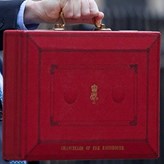‘They call you the fiscal drag queen of British politics, don't they? And with good reason, the net effect of your time in No 11 Is that taxes are still going up.’
Amol Rajan, BBC Presenter
 As Amol Rajan said in his BBC interview with Jeremy Hunt, the Chancellor has already earned a reputation for stealth tax with his long-term freeze on income tax thresholds, as inflationary pay and pension rises push huge numbers of people into higher tax brackets. But in last week's UK Budget, we saw consolidation of another significant shifting of the tax burden — this time, by pushing down National Insurance rates for younger working people while pensioners see no benefit (as they don't pay National Insurance).
As Amol Rajan said in his BBC interview with Jeremy Hunt, the Chancellor has already earned a reputation for stealth tax with his long-term freeze on income tax thresholds, as inflationary pay and pension rises push huge numbers of people into higher tax brackets. But in last week's UK Budget, we saw consolidation of another significant shifting of the tax burden — this time, by pushing down National Insurance rates for younger working people while pensioners see no benefit (as they don't pay National Insurance).
Had this only happened once, in last year's Autumn Statement, it might have been seen as a ‘flash in the pan’; but there's clearly a strategy being quietly rolled out as the overall rate of Employee NI has dropped by 40% during this financial year.
Moving the tax burden towards older folk is a sensible strategy, in our view. Indeed, we would like to see mandatory private health insurance for wealthy old folk as a first step towards resolving the dysfunctional and absurdly expensive National Health Service. However, the Chancellor is moving very carefully and quietly, in order to avoid upsetting his elderly Conservative Party support base.
The Chancellor’s move towards funding state pensions and healthcare out of general taxation does merit a closer look. For the past 75 years, UK governments of all hues have held on to the belief that, just as in the private sector, these need to be funded by ‘insurance’. At the personal, individual level, this is appropriate due to uncertainty in terms of longevity and sickness in old age; however there's little logic for it across the population as a whole.
It was socialism that dictated the ‘free at the point of use’ mantra for the health service, but this separate stream of National Insurance funding has been maintained throughout. Now all that is changing, and it's difficult to see how an incoming Labour administration could change this direction of travel.
The key problem with the health service is its desperate state of inefficiency. Only last week an ambulance turned up to attend to a seriously-ill elderly person only to advise that, while going to hospital was the right course of action, it would involve a ten-hour wait either on a trolley or in the ambulance outside Accident & Emergency.
The Government fully acknowledges the need to improve health service efficiency/productivity: hence its £2.5 billion investment in introducing new automation. But the problem is not mechanical — it's the result of 75 years of monopolistic provision controlled by government dictat. What patients need is choice so that the resultant competition between providers would drive efficiency and productivity improvements.
The fact is, socialism is a ‘busted flush’. By imposing universal solutions, all we are doing is taking support away from those who most need it, the low-income/disadvantaged. A more egalitarian form of capitalism would ensure that public-funded support would be targeted for those who really need it, but who can’t afford to pay.
The irony is that it will take a Labour government to move us away from socialism, because the Conservatives fear losing their electoral support base amongst the elderly.
Aside from National Insurance, the UK Budget had few big stories to tell. The phasing-out of ‘non-dom’ tax status could unsettle high-level property prices in London, but the four-year transition period will likely cushion its impact. In the field of investment, the decision to introduce a new ‘British ISA’ allowance could have been rather more generous: if so, it might have resulted in higher retail demand for the NatWest share issue planned to take place in the next few months.
However, it was disappointing not to hear any mention of ensuring that the Child Trust Fund harvest is successfully delivered to young adults who know nothing about it, during the one hour and more that the Chancellor was on his feet. The Budget took place just 24 hours after The Share Foundation’s CTF conference in Church House, Westminster on Tuesday 5th March, and we are hopeful that the one Member of Parliament who took part, Danny Kruger, will refer to the £2 billion challenge of unclaimed matured accounts during the Budget debate.
However the CTF event went well, and The Share Foundation was pleased to welcome HM Revenue & Customs and all the major account providers to the event. Presentational content is being made available via the conference website, www.sharefound.org/ctfconference, and we would encourage listeners to check out the details.
To a degree, our focus on inter-generational rebalancing is being mirrored by the Chancellor's stealthy moves towards shifting the tax burden towards the elderly. In our recent commentary, ‘New Approach Needed for Bequests’, we drew attention to the wholesale demographic shift that is occurring as the ‘first world’ birth rate falls , and the resultant significantly greater minority-ethnic proportion amongst the young makes this all the more important.
So, whichever Party comes into Government on the other side of the UK General Election, it must stop pussy-footing along with stealthy tax transitions. It must instead accept that we need a strong new strategy for inter-generational rebalancing, and a system for re-shaping healthcare support which will lift the burden of debt on future generations.
Gavin Oldham OBE
Share Radio

